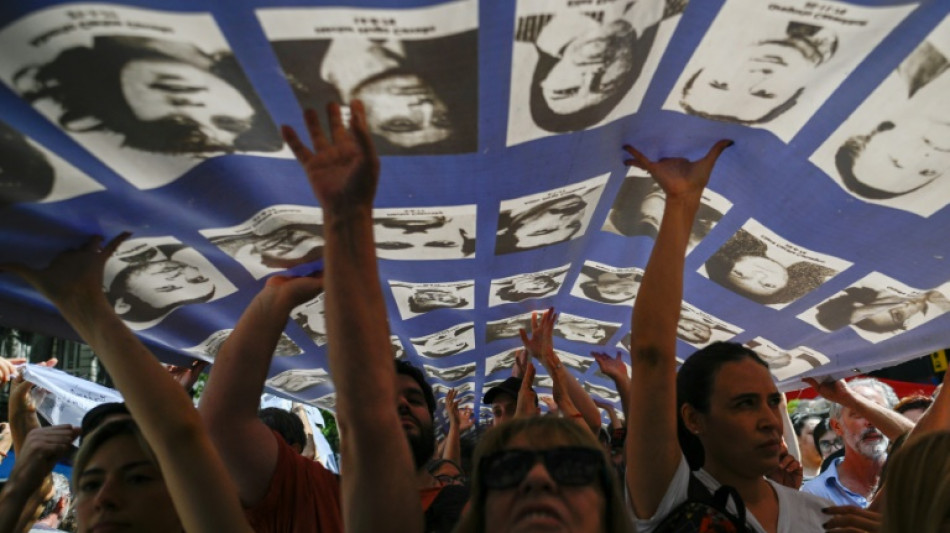
-
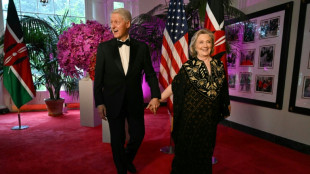 US Republicans begin push to hold Clintons in contempt over Epstein
US Republicans begin push to hold Clintons in contempt over Epstein
-
Trump says agreed 'framework' for US deal over Greenland

-
 Algeria's Zidane and Belghali banned over Nigeria AFCON scuffle
Algeria's Zidane and Belghali banned over Nigeria AFCON scuffle
-
Iran says 3,117 killed during protests, activists fear 'far higher' toll
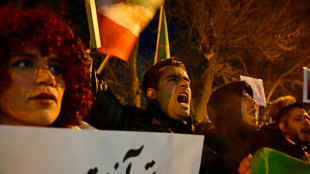
-
 Atletico frustrated in Champions League draw at Galatasaray
Atletico frustrated in Champions League draw at Galatasaray
-
Israel says struck Syria-Lebanon border crossings used by Hezbollah

-
 Snapchat settles to avoid social media addiction trial
Snapchat settles to avoid social media addiction trial
-
'Extreme cold': Winter storm forecast to slam huge expanse of US

-
 Jonathan Anderson reimagines aristocrats in second Dior Homme collection
Jonathan Anderson reimagines aristocrats in second Dior Homme collection
-
Former England rugby captain George to retire in 2027

-
 Israel launches wave of fresh strikes on Lebanon
Israel launches wave of fresh strikes on Lebanon
-
Ubisoft unveils details of big restructuring bet

-
 Abhishek fireworks help India beat New Zealand in T20 opener
Abhishek fireworks help India beat New Zealand in T20 opener
-
Huge lines, laughs and gasps as Trump lectures Davos elite

-
 Trump rules out 'force' against Greenland but demands talks
Trump rules out 'force' against Greenland but demands talks
-
Stocks steadier as Trump rules out force to take Greenland

-
 World's oldest cave art discovered in Indonesia
World's oldest cave art discovered in Indonesia
-
US hip-hop label Def Jam launches China division in Chengdu

-
 Dispersed Winter Olympics sites 'have added complexity': Coventry
Dispersed Winter Olympics sites 'have added complexity': Coventry
-
Man City players to refund fans after Bodo/Glimt debacle

-
 France's Lactalis recalls baby formula over toxin
France's Lactalis recalls baby formula over toxin
-
Pakistan rescuers scour blaze site for dozens missing
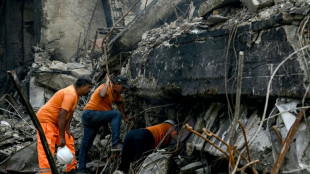
-
 Keenan return to Irish squad boosts Farrell ahead of 6 Nations
Keenan return to Irish squad boosts Farrell ahead of 6 Nations
-
US Treasury chief accuses Fed chair of 'politicising' central bank

-
 Trump rules out force against Greenland but demands 'immediate' talks
Trump rules out force against Greenland but demands 'immediate' talks
-
Israeli strike kills three Gaza journalists including AFP freelancer
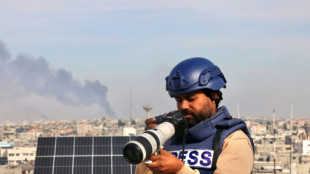
-
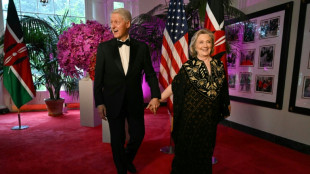 US Congress targets Clintons in Epstein contempt fight
US Congress targets Clintons in Epstein contempt fight
-
Huge lines, laughs and gasps as Trump addresses Davos elites

-
 Trump at Davos demands 'immediate' Greenland talks but rules out force
Trump at Davos demands 'immediate' Greenland talks but rules out force
-
Australia pauses for victims of Bondi Beach shooting

-
 Prince Harry says tabloid coverage felt like 'full blown stalking'
Prince Harry says tabloid coverage felt like 'full blown stalking'
-
Galthie drops experienced trio for France's Six Nations opener

-
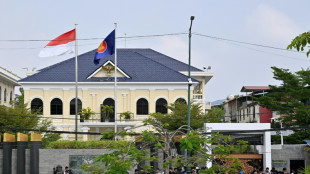 Over 1,400 Indonesians leave Cambodian scam groups in five days: embassy
Over 1,400 Indonesians leave Cambodian scam groups in five days: embassy
-
ICC rejects Bangladesh's plea to play T20 World Cup matches outside India

-
 Prince Harry says UK tabloid court battle in 'public's interest'
Prince Harry says UK tabloid court battle in 'public's interest'
-
Trump lands in Davos to push Greenland claims

-
 Balkan wild rivers in steady decline: study
Balkan wild rivers in steady decline: study
-
Injured Capuozzo misses out on Italy Six Nations squad

-
 Mourners pay last respects to Italian icon Valentino
Mourners pay last respects to Italian icon Valentino
-
EU parliament refers Mercosur trade deal to bloc's top court

-
 Odermatt seeks first Kitzbuehel victory with eye on Olympics
Odermatt seeks first Kitzbuehel victory with eye on Olympics
-
Italy's Brignone to be rested for Spindleruv Mlyn giant slalom

-
 Alcaraz spearheads big names into Australian Open third round
Alcaraz spearheads big names into Australian Open third round
-
European stocks dip ahead of Trump's Davos speech

-
 Trump flies into Davos maelstrom over Greenland
Trump flies into Davos maelstrom over Greenland
-
EU won't ask Big Tech to pay for telecoms overhaul

-
 Railway safety questioned as Spain reels from twin train disasters
Railway safety questioned as Spain reels from twin train disasters
-
Marcell Jacobs back with coach who led him to Olympic gold

-
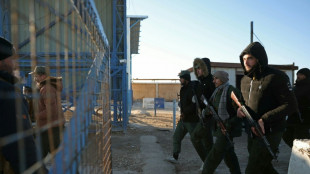 Syria army enters Al-Hol camp holding relatives of jihadists: AFP
Syria army enters Al-Hol camp holding relatives of jihadists: AFP
-
Brook apologises, admits nightclub fracas 'not the right thing to do'


Milei reignites debate on Argentine dictatorship, military
President Javier Milei's government has rekindled debate over Argentina's military dictatorship by questioning the number of its victims, while also seeking a greater role for the armed forces in tackling ongoing security issues.
This week, at an event with veterans of the Falklands War that Argentina lost to the United Kingdom in 1982, Milei lashed out at what he said was a policy under previous governments of "harassing and humiliating" the military.
"That time is over," he said. "They will have the respect that has been long denied to them."
But Milei, a political outsider who won the presidency in November, is also facing pushback -- both on the streets and from some of his own conservative allies, including his vice president.
His comments at the Falklands event came after his government recently released a short documentary questioning the number of the 30,000 victims that rights groups estimate disappeared under the 1976-83 military junta, which employed brutal tactics to crack down on leftist dissent.
And, last month, Milei announced he was planning a legal reform that would allow the armed forces to intervene in domestic security operations.
The measure is aimed at fighting what the government dubs "narcoterrorism" in Rosario, a city mired in drug violence 300 kilometers (186 miles) northwest of the capital.
"The country has to be able to leave its wounds behind and move towards the future. The armed forces today are an integral part of our democracy," said Security Minister Patricia Bullrich.
- 'Drug traffickers in flip-flops' -
The effort to give greater powers to the army has hit a sensitive nerve, and is rejected by large sectors of society across the political spectrum.
Vice President Victoria Villarruel, who comes from a military family and has close ties to the armed forces, has spoken against Milei's plan, saying: "The role of the armed forces is not to fight civilians."
Villarruel's criticism comes even as she has also questioned the number of missing and backs the "two demons theory" which justifies the violence meted out by the military regime as having been necessary to combat leftist guerilla groups.
Critics argue that this theory minimizes state violence from the junta era, such as torture, disappearances, extrajudicial killings and the theft of babies from pregnant prisoners.
Since 1991, the army in Argentina has only been allowed to provide equipment and technical support to the police, without intervening directly in domestic affairs.
"We have to ask ourselves if the level of drug violence in Rosario warrants the use of the armed forces. Here we are talking about drug traffickers in flip-flops," said Jorge Luis Vidal, a specialist in public security management and the fight against drug trafficking.
- 'The full story' -
Efforts to change the role of the armed forces coincide with a review of their actions during the dictatorship and its victims.
Milei argues that 8,753 people went missing under military rule, far less than the 30,000 estimated as disappeared by rights groups and parties across the political spectrum.
The president's figure is closer to the 8,961 recorded in the report by the National Commission on the Disappearance of Persons (Conadep), published in 1984 and described as "an open list."
Marcela Perelman, a researcher at the Center for Legal and Social Studies, told AFP "this is not a new discussion, it has happened in other political eras."
She said the debate was not about uncovering the truth, but "accusing the victims of a lack of information that in any case is the state's responsibility."
In the video released by the government on March 24, the 48th anniversary of the coup, the government called for "the full story" of the dictatorship to be told.
That same day tens of thousands of people protested across the country, holding up signs reading "They are 30,000," in one of the biggest demonstrations marking the anniversary in years.
S.Gantenbein--VB




